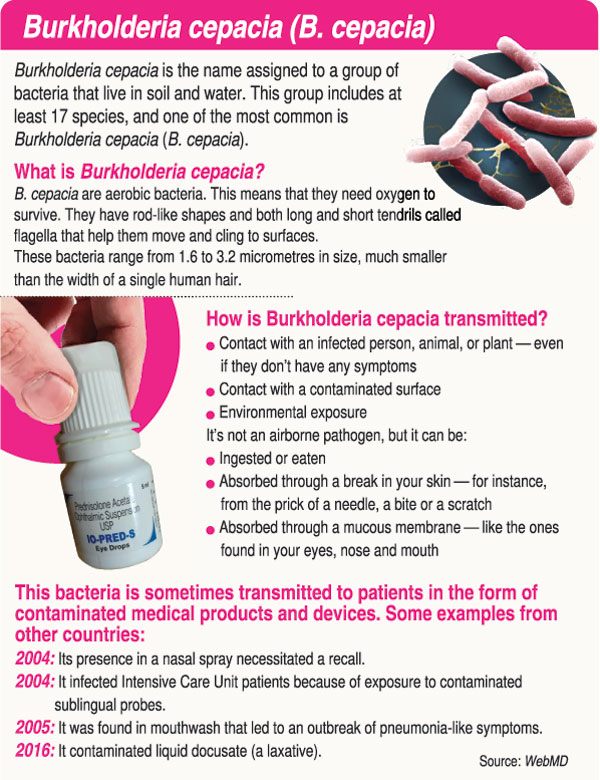News
Concerns raised as common eye-drop causes infections among 6 post surgery patients
View(s):- Health Ministry temporarily halts use of Prednisolone Acetate Suspension
By Kumudini Hettiarachchi
The micro-bug Burkholderia cepacia (B. cepacia) has been identified as the culprit causing the infections among six patients who had undergone surgery at the National Eye Hospital in Colombo this week.
This bacterium had been isolated not only in opened and unopened bottles of a common eye-drop used on these patients but also in some tissue samples sent from the eyes of these patients as well as consumables (such as corneal buttons) used during the surgeries, the Sunday Times understands.
The eye-drop is Prednisolone Acetate Ophthalmic Suspension USP 10-PRED-S, a common steroid and anti-inflammatory medication used after eye surgery. These stocks have been imported from India. The Health Ministry has temporarily halted the use of this eye-drop.
“It was when there was a deterioration in the vision of six patients on whom four bottles of the eye-drop were used that the bottles along with the other samples were sent for microbiological analysis,” a source said, adding that there are antibiotics to treat those infected with this bacterium.
The samples had been confirmed as being contaminated by this bacterium by an independent state body, while the Medical Supplies Division (MSD) and the National Medicines Regulatory Authority (NMRA) are still performing the testing.
Many doctors were of the view that the origin of infection is weighed towards the eye-drop.
All equipment used during these surgeries have also been tested for this bacterium and plans were underway to close and fumigate the operating theatres. Now that the organism has been isolated, steps are being taken to resume surgeries with all precautions in place.
When contacted, the Deputy Director General (DDG) in charge of the MSD, Dr. D.R.K. Herath said that the instructions to temporarily halt the use of this eye-drop were issued to all state hospitals through a note sent out on Wednesday (April 19).
“This followed the National Eye Hospital bringing to our notice that there was a problem with this eye medication. Samples have been sent for testing for microbial contamination and it would take more than a week for such checking. The eye medication would not be used until then,” he said.
When asked whether adverse reactions had been reported from other hospitals after the administration of this eye-drop, Dr. Herath answered in the negative, adding that there was speculation about a similar thing at the Nuwara Eliya Hospital, but no confirmation.
To the query whether this eye-drop would be accessible to people through private pharmacies, he said it should not be, as it is distributed only among state hospitals.
NMRA Chairperson, Prof. S.D. Jayaratne said that this eye-drop is a registered medicine. As soon as the NMRA was told of a possible issue with the medication, it sent samples for testing to its National Medicines Quality Assurance Laboratory (NMQAL).
The testing would take about a week, he said, adding that this eye medicine is from India. The MSD has issued instructions that the use of this eye medication be temporarily stopped until such testing is completed. Once the test results are issued, if there is contamination the stocks would be withdrawn.
When asked about drug failures since January 2023, Prof. Jayaratne said there were several “recalls and withholds”.

They included:
Withheld –
A batch of Colistimethate Sodium for injection, infusion inhalation (an antibiotic) manufactured in the United Kingdom which was an unregistered product.
A batch of Dexamethasone Sodium Phosphate injection USP 4mg/ml (steroid used for severe allergies) manufactured in India.
A batch of Hydroxyurea capsules USP 500mg (an anti-cancer drug) manufactured in India.
Withdrawn –
A batch of Meropenem for injection USP 1g or 500mg (a strong antibiotic) manufactured in Pakistan.
Two batches of Ceftazidime for injection USP 1000mg (an antibiotic) manufactured in India.
Voluntary recall –
Dried Aluminium Hydroxide 250mg+Magnesium Hydroxide BP 250mg+Simethicone BP 50mg+Oxetacain BP 10mg/5ml suspension (used for gastritis) manufactured in India.
The best way to say that you found the home of your dreams is by finding it on Hitad.lk. We have listings for apartments for sale or rent in Sri Lanka, no matter what locale you're looking for! Whether you live in Colombo, Galle, Kandy, Matara, Jaffna and more - we've got them all!

